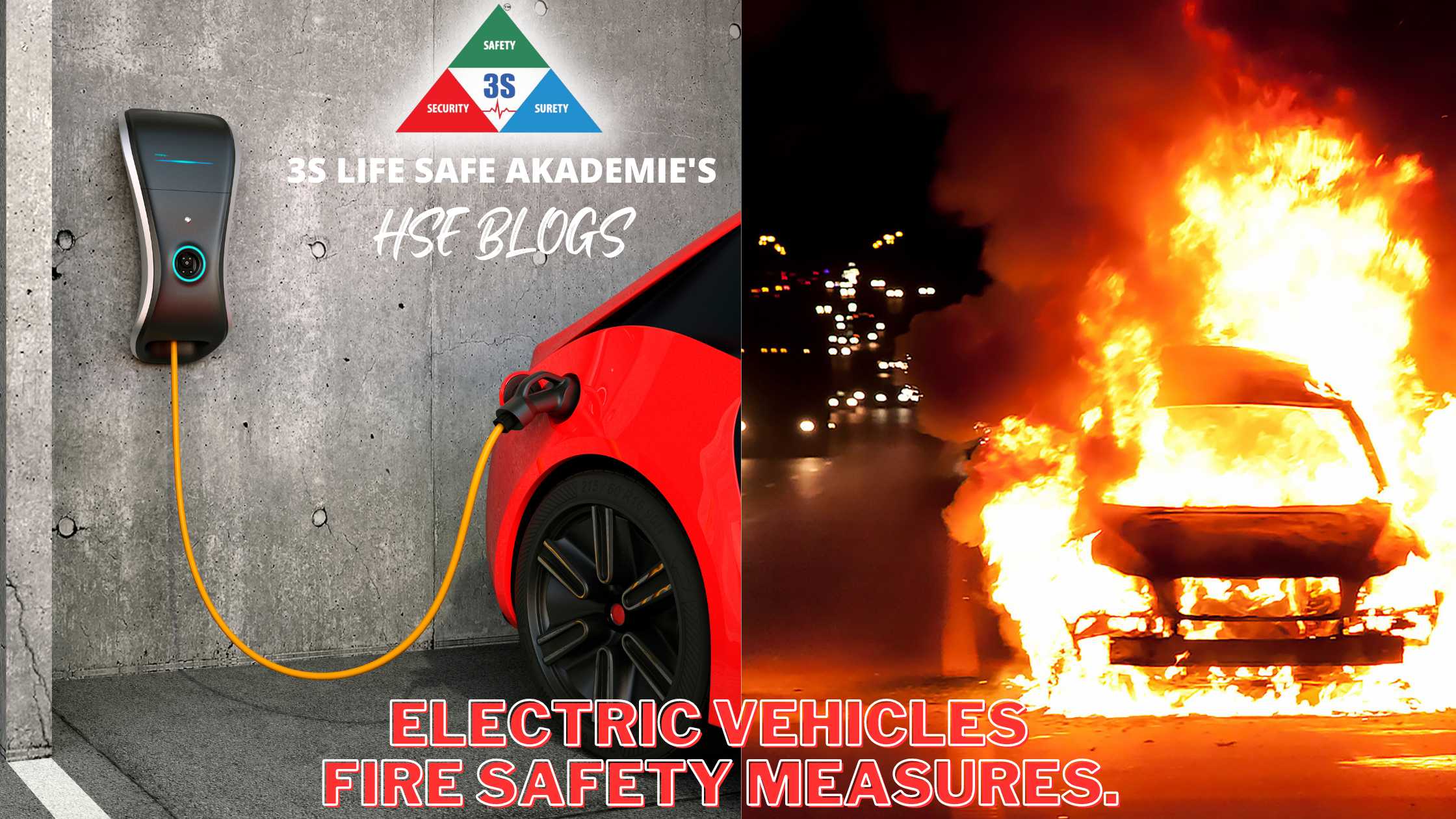100% placement assistance and support

Posted by 3S LIFE SAFE AKADEMIE on 27 Feburary 2023
As people become more concerned about the impact of fossil fuels on the environment, electric vehicles (EVs) are gaining popularity as a greener alternative to traditional gasoline-powered cars. EVs use electricity stored in rechargeable batteries to power an electric motor, rather than burning fossil fuels, which produces harmful emissions. This makes them a more environmentally-friendly option, particularly in urban areas where air pollution is a major concern. While EVs offer many benefits, including reduced emissions and lower operating costs, concerns around their safety have also emerged, particularly in relation to the risk of fire. In this blog, we will explore the safety considerations surrounding EV fires and what measures are being taken to mitigate these risks.
EV fires can occur due to a range of factors, including problems with the battery, the charging system, or the electrical components of the car. Although lithium-ion batteries are a popular choice for electric vehicles (EVs), they can still pose a risk if they are damaged, overheated, or overcharged. While these batteries are generally considered safe, they contain flammable electrolytes that can ignite if they come into contact with oxygen in the air. If a battery cell is punctured or damaged, it can cause a dangerous chain reaction that can lead to a fire. Therefore, it is important to handle and maintain these batteries with care to reduce the risk of accidents or malfunctions. Similarly, if a battery is overcharged or overheated, it can cause a thermal runaway reaction that can lead to a fire.
Another potential source of fire in EVs is the charging system. EV charging stations and the cables used to charge EVs can overheat or short circuit, which can cause a fire. Finally, problems with the electrical components of the car, such as faulty wiring or a malfunctioning circuit board, can also increase the risk of an EV fire.
To reduce the risk of EV fires, manufacturers have implemented a range of safety measures, including:
Battery Management Systems: EVs are equipped with sophisticated battery management systems that monitor the battery’s performance and temperature, and can shut off the battery if it detects any abnormalities.
Thermal Management Systems: EVs are equipped with thermal management systems that help regulate the temperature of the battery. This system is designed to kick in and cool the battery down, preventing it from overheating. This is a crucial safety feature, as overheating can cause a thermal runaway reaction that can lead to a fire. Therefore, the thermal management system plays an important role in maintaining the safety and reliability of the EV’s battery system.
Safety Disconnects: EVs have safety disconnects that can shut off the battery in the event of a collision, which can prevent a fire from starting.
Fire Suppression Systems: Some EVs are equipped with fire suppression systems that can quickly extinguish a fire if one does occur.
Charging Station Safety: EV charging stations are also subject to safety regulations and standards, and must undergo rigorous testing to ensure they are safe and reliable.
In addition to these measures, firefighters and emergency responders are also receiving training on how to safely handle EV fires, which includes understanding the unique risks and hazards associated with EVs.
While the risk of EV fires cannot be completely eliminated, manufacturers and regulators are taking steps to reduce the risk and improve safety. As EV technology continues to evolve, it is likely that further safety measures will be implemented to mitigate the risk of EV fires. In the meantime, it is important for EV owners to be aware of the potential risks and to take steps to ensure the safe operation of their vehicles. This includes regular maintenance and inspection of the car’s electrical components and battery, as well as following recommended charging procedures and safety guidelines.
Thanks for Reading
3S LIFE SAFE AKADEMIE, India’s a fast growing, well known, leading institute in “Occupational Health & Safety” and “Fire & Industrial Safety”.
We are demonstrating importance of safety and creating a safe work culture by means of successful training and workshop. We are emphasizing that, Safety should be the priority for everyone and everywhere. We are providing necessary safety training to various organization across the country.
The brand image and reputation of 3S LIFE SAFE AKADEMIE is encouraging having average Google rating 5. Such encouraging customer’s rating is only due to our ability to deliver and provide high quality services to everyone.
We Are Accrediated with
NEBOSH, UK : Learning partner (1478)
IOSH, UK (Approved Training Provider 4501)
Swami Vivek Ananda University
Arunodaya University
We are currently giving Training for all Below Mentioned Courses:
Becoming more skilled towards the safety we suggest you to join certification courses like NEBOSH and safety diploma Courses to meet our the huge demand of HSE professional in electrical industries.
For more information contact 7975371948
or Email id info@lifesafeacademy.com
Or Fill the below given form to Contact you